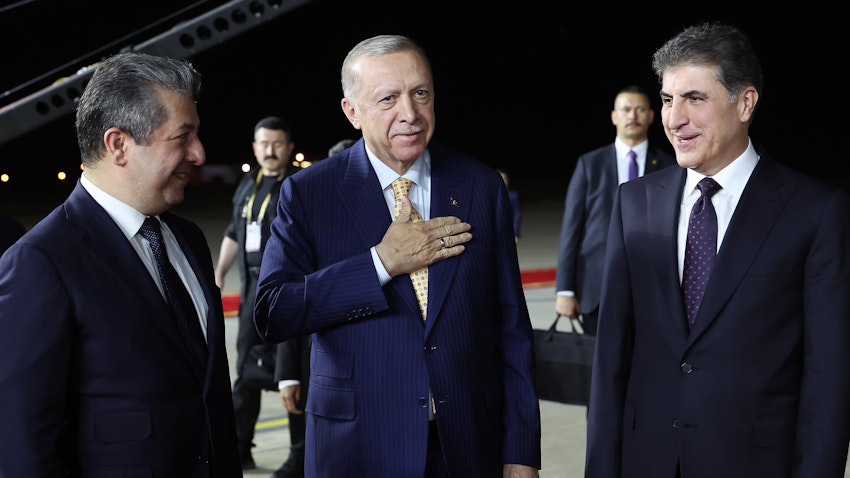Turkey has announced a potential peace process with the Kurdistan Workers’ Party (PKK), a group it has battled for decades. This unexpected move could significantly reshape Turkey’s internal politics and the region’s geopolitical landscape. The initiative comes as Turkey navigates concerns about the widening conflict between Israel and Iran, which could destabilize the region further.
Motives Behind the Peace Process
The Turkish government appears motivated by both domestic and regional factors. Domestically, resolving the long-standing conflict with the PKK could bring stability and boost political support for the ruling party. President Recep Tayyip Erdogan, along with Devlet Bahceli of the Nationalist Movement Party, sees this peace effort as a way to address internal challenges while gaining Kurdish support ahead of the 2028 elections.
Regionally, Ankara is wary of how the Israel-Iran conflict might shift power dynamics. Turkey fears that a weakened Iran could create a vacuum that Israel might fill. Israel has historically supported Kurdish groups in the region, raising concerns in Ankara about a possible alignment between Tel Aviv and Kurdish factions. By engaging the PKK in peace talks, Turkey aims to prevent such alliances and safeguard its interests.
Regional Repercussions
The peace process could alter relations among Kurdish groups across Iraq, Syria, and Turkey. Kurdish leaders in Iraq and Syria have shown cautious support for Turkey’s efforts, signaling a willingness to adapt to a new political environment. This shift could lead to greater cooperation or rivalry among Kurdish factions, depending on how the negotiations unfold.
Israel’s ties with Kurdish groups have also raised eyebrows in Ankara. Tel Aviv has long viewed the Kurds as potential allies, particularly in countering shared adversaries like Iran. Recent statements from Israeli officials praising the Kurdish people underscore these connections. This backdrop adds urgency to Turkey’s efforts to engage the PKK and prevent further complications in the region.
Challenges to the Peace Process
Despite these strategic motivations, the peace process faces significant hurdles. Recent attacks by the PKK on Turkish arms facilities and subsequent retaliatory strikes by Ankara have escalated tensions. These incidents highlight the deep mistrust between the two sides and the challenges of transitioning from conflict to dialogue.
Adding complexity, imprisoned PKK leader Abdullah Ocalan has emerged as a key figure in the proposed peace talks. Turkish officials have hinted at involving Ocalan in the process, even suggesting the possibility of his release if he supports peace efforts. Ocalan’s recent meetings with family members and pro-Kurdish political representatives suggest that discussions are underway. However, his influence over the PKK and its affiliates remains uncertain.
Domestic Implications
On the home front, the peace initiative is seen as a strategic move to consolidate political power. Resolving the conflict could reduce security spending, improve public trust, and address long-standing grievances among Turkey’s Kurdish population. Winning over Kurdish voters could prove pivotal for Erdogan’s re-election bid in 2028.
The Turkish government has also framed the peace process as part of a broader effort to strengthen national unity. By ending the PKK insurgency, Ankara hopes to focus on economic recovery and addressing pressing issues like inflation and unemployment. However, skepticism remains among opposition parties and segments of the public who question the sincerity of the government’s intentions.
Potential Outcomes
If successful, the peace process could transform Turkey’s political and social landscape. A lasting ceasefire would allow the government to redirect resources toward economic development and international diplomacy. It could also pave the way for improved relations with neighboring countries and reduced tensions in border areas.
However, failure to reach a meaningful agreement could worsen the conflict and destabilize the region further. The involvement of multiple stakeholders, including Kurdish groups in Iraq and Syria, adds layers of complexity to the negotiations. Additionally, Israel’s growing interest in Kurdish affairs could influence the outcome of the peace process in unforeseen ways.
Looking Ahead
Turkey’s move to engage the PKK in peace talks reflects both ambition and pragmatism. The process carries the potential to reshape domestic politics and regional alliances. However, the road to peace is fraught with challenges. As Turkey navigates these complexities, the world will be watching closely to see if this initiative can bring lasting change to a region long plagued by conflict.

